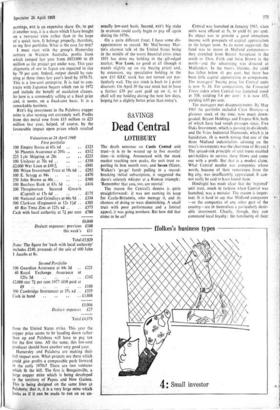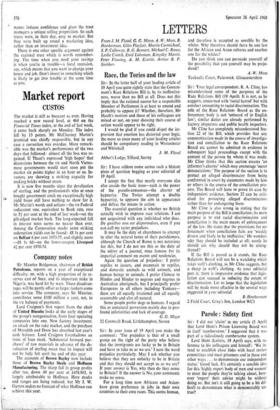Dead Central
SAVINGS LOTHBURY
The death sentence on Castle Central unit trust—it is to be wound up in five months' .time—is striking. Announced with the stock market reaching new peaks, the unit trust re- porting its best month ever, and Invan (Slater, Walker's `go-go' fund) pulling in a record- breaking initial subscription, it suggested the slave's salutary whisper at a Roman triumph: `Remember that you, too, are mortal.'
The reason for Central's demise is quite straightforward: it was not earning its keep for Castle-Britannia, who manage it, and its chances of doing so were diminishing. A small trust with poor performance and a limited appeal, it was going nowhere. But how did that come to be so? Central was launched in January 1965, when units were offered at 5s, to yield 64 per cent. Its object was to provide a good immediate income with prospects of capital appreciation in the longer team. As -its name suggested, the fund was to invest in Midland companies— they stretched from Bristol Aeroplane in the south to Thos. Firth and John Brown in the north—and the advertising was directed at Midlanders. In the trust's lifetime, the yield has fallen below 44 per cent, but there has been little capital appreciation to compensate. The managers' buying price for Central units is now 5s 3d. For comparision, the Financial Times index when Central was launched stood at 338, yielding 5.4 per cent: it is now 457, yielding 4.05 per cent.
The managers met disappointments. By May 1965 the portfolio included Clear Hooters—a glamour stock of the time, now much down- graded; Bryant Holdings and Empire Rib, both of which have had rough passages since; Five Oaks Investment, which is passing its dividends; and De Vries Industrial Diamonds, which is in liquidation. (It is worth noting that one of the three Midland industrialists advising on the trust's investments was the chairman of Bryant.) The spread-risk principle of unit trusts enabled unit-holders to survive these blows and come out with a profit. But that is a modest claim. What Central needed was companies whose worth, because of their remoteness from the big city, was insufficiently appreciated. It can- not really be said to have found them.
Hindsight has made clear that the 'regional' unit trust, much in fashion when Central was launched, was a mistake. The reason is impor- tant. It is hard to say that Midland companies —or the companies of any other part of the country—are in themselves a particularly desir- able investment. Clearly, though, they can command local loyalty: the familiarity of their
names induces confidence and gives the trust managers a unique selling proposition. So such trusts were, in their day, easy to market. But they were built up round a marketing idea, rather than an investment idea.
There is one other specific argument against the regional trust which is worth remember- ing. The time when you need your savings is when you're in trouble—a local recession, say, which means that you want to change your house and job. Don't invest in something which is likely to get into trouble at the same time as you.







































 Previous page
Previous page